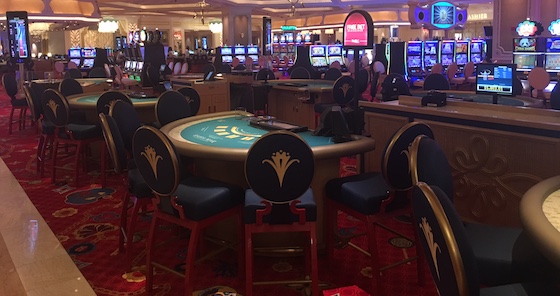In this month in 1812, Napoleon entered Moscow, which lead to the one of the greatest failures in military history. The Russians had led Napoleon’s troops to their doom, and set the city on fire, wiping out any source of food and supplies. The Russian winter was so severe that only 20,000 of Napoleon’s 500,000 troops survived. Taking bold gambles can sometimes lead to big victories, but just as frequently giant losses. We like self-storage because it’s stable and not subject to big market shifts. Americans love to buy goods and then need to store them. They become destabilized and store goods while they move cities or jobs. They seek more room in their ever-smaller homes and store goods to free up room for more essential uses. The demand is always there. While some people like to buy stocks or gamble at blackjack, we feel that the best way to make money is to do it slowly and consistently. It may appear boring to some folks, but the final result is nearly always a happy ending.
Memo From Frank & Dave
How Due Diligence Removes Risk In Self-Storage Acquisitions

Benjamin Franklin once said “diligence is the mother of good luck”. While he never owned a self-storage property, his words are as true today as they were 250 years ago. Indeed, those who perform quality due diligence on their acquisitions have much greater success and less risk than those who do not. So what makes diligence so essential on any self-storage facility, and how does it actually reduce the risk?
Market issues
Good due diligence involves a careful study of the market that the self-storage property is located in. You check out the population as well as the occupancy of similar facilities in the area. You find where the desirable areas of town are, and where the higher demographic residents are located that would need storage. You learn about trends in population growth, and what sectors are experiencing growth and which are in decline. These statistics ensure that the property is in a good location for storage, and that the market is not going to decline over time.
Financial issues
All of your economic assessments are essential to make sure that you are buying the income stream you think you are, as well as to model the impact of higher rents and occupancy (or lower if that’s what you are expecting). We like to check our numbers at least three times to make sure that we have not made an error. In an environment in which most storage properties are sold at around an 8% cap rate, that means that if you miss the net income expectation by $1,000 per year, it means you overpaid by $12,500. And if you missed your estimate by $10,000, it means a $125,000 mistake. It’s a blessing that most properties do not include seller financing, as the bank will also scrutinize your numbers, as well the appraisal. Those who succeed in self-storage are extremely cautious about their projections.
Operational issues
Good due diligence ensures that you have a handle on all operational problems and opportunities, from the advertising to the on-site management and collections procedures. You should know exactly how units are rented from the first call to signing the rental agreement. By understanding how things work, you know exactly what to expect from the moment you take over, as well as what you can improve on. This knowledge allows you make immediate management changes if you need to, as well as to make sure the manager stays if that’s the correct course of action.
Physical issues
Smart buyers will conduct studies to make sure that the buildings are in great shape with no leaks or other issues, and that all utility systems are working fine. A Phase I environmental study demonstrates that there are no pollutants that would require costly remediation. If you do not have a solid handle on the condition of the facility, you may be stuck with costly, non-budgeted repair issues, or even hazards that could end in litigation.
So what can go wrong?
Performing great diligence cannot remove all risk. Even the best storage investor can be hit with situations beyond their control and analysis. But most of these risks can be removed through proper insurance, such as fires or employee actions. The whole point to diligence is to remove the risk in what we can control. That’s what creates Franklin’s “good luck”. But the other part of dealing with minimizing risk is to acknowledge what can go wrong and try to insure against it or create a “Plan B” for anything that may come up.
Conclusion
Ben Franklin would have been a great storage investor. He would have worked hard to remove all risk from his analysis of the potential performance of his investment. Follow Franklin’s example on your own storage purchases, and you will have “good luck” every time.
Self Storage Home Study Course
Our Home Study Course is not like anything you have ever listened to or read before. We do not fill it with a bunch of fluff on how your are going to make a million bucks with no money down. We tell you the whole story... the good, the bad, and the sometimes ugly.
Click Here for more information.
The Importance Of Appreciating Money

At a certain point in any investor’s career, it seems harder and harder to get excited about making money. As you grow older and richer, the value of money sometimes evaporates. So how can you get excited again about saving every penny, and increasing every dollar of revenue?
Translate money into things you like: create a commodity
One method is to start changing your “currency” from cash to items that are more interesting or important to you. A management executive told me that he found the best way to motivate employees was to find out what they really treasured and give them that instead of cash. For example, if a worker was really into baseball, give them game tickets instead of the same amount in money. And that’s true for everyone – items can sometimes seem more exciting than the same amount in cash. Perhaps you can say “if I can increase the net income $1,000, that’s a Gucci watch” or “a $5,000 increase in profit this year means I’m taking the family to Atlantis”.
Have family members participate
Another way to make money fun again is to select a family member as a “team mate” and dedicate a portion of whatever you make to them for the year. While you may have trouble getting worked up over $100, your team mate sure will, as that will buy one heck of an item at the toy store, or a great ticket to a rock concert. It’s also a great way to bond and end up with a new best friend.
Give money away to those who need it
The technique that Bill Gates and Warren Buffett use is to dedicate every dollar to a charitable cause. $100 equals glasses for a child in need, and $500 can buy a child with a cleft lip reconstructive surgery. Larger amounts can mean a new school building, or even an important donation to the construction of a new hospital wing.
Conclusion
If you are losing your edge in watching every penny, find fresh ways to make money fun again. This can bring back your former sparkle and give you some real enjoyment that money can’t buy.
Gut Instinct: One Of The Most Important Parts Of Any Self-Storage Purchase

Have you ever seen how an aircraft carrier works? You have a huge room with a bunch of computers and sailors yelling out key data like “incoming missile 1,000 miles” and “four planes on the deck” and then there’s the captain in the middle of the room who shouts out orders like “fire off the four planes and loan four more” and “send anti-missile defenses” and “increase speed 10 knots and turn the ship 10 degrees to the east”. What’s going on – why don’t the computers just tie to each other and not need the captain? The reason is that the human mind is still superior to the computer: intuition is one of the most advanced senses you possess.
Our personal experiences
Every time we have disobeyed our gut instinct, we have regretted it later. In one case, early in our career, we had bad vibes about a market, but the pressure of the broker and the bank lender forced us to move forward and close. We thought “maybe our instinct is wrong and the market is fine”. But it wasn’t and, although we sold the deal for a small profit later, the deal required way too much effort and risk than it was worth.
How to form a strong gut instinct
A strong gut instinct requires a huge amount of information flow. Just like that captain on the aircraft carrier, you need a constant stream of current data to form opinions. Those who perform the more thorough due diligence are the ones with the most accurate gut instincts. Gathering and filtering data is what gives your brain the edge in making good decisions.
How to harness that power to make right decisions
You should never buy a storage property without feeling good about it. You should be excited. If you are not 100% confident in our purchase, put on the brakes. Get an extension. Don’t go forward until you are 100% sure you are happy with what you’re doing. Acknowledge the power of your gut instinct and its attributes for self-preservation.
Conclusion
One of the most powerful weapons you have as a storage buyer is your gut instinct. It is a highly advanced tool that is very accurate and can always keep you out of trouble if you will obey its commands.
The Fun And Excitement Of Cash Businesses

There are many types of investments. Some have no returns until you sell them. For example, if you buy raw land, you will not receive a dime in profit until you sell it a decade later. You have to mow it, maintain it, pay tax on it, insure it, and yet you get nothing until the moment it is sold. And if you start a business like Amazon, you can work, worry, and still have nothing tangible to show for it until years into the future (if at all). But other businesses are built on cash, and the more you generate, the more that goes into your pocket. These little rides in the mall require quarters to operate. The owner goes around every week and takes out the quarters, and that money is for them to keep. Cash flow businesses are reassuring and fun. There’s something to be said for immediate gratification.
Don’t Be Afraid To Ignore The Investment “Herd”

Fish travel in schools. They tend to follow the pack, even if it’s directly into the fisherman’s net. And the same can be said for the common American tendency to invest in the same things as everyone else. The result are often bad returns or total loss on investment. So why not follow the “herd”?
Dot.com, subprime mortgage, do we need to say more?
History is littered with examples of the financial ruin that comes from doing what everyone is doing. The Dutch Tulip Crisis of 1637 wiped out financial markets with the panic resulting from the decline of everyone investing in tulip bulbs at the same time. 300 years later, you had the Great Depression of 1929 from every American buying up stocks to ridiculous levels. In recent times, you have the dot.com bust as well as the 2007 Great Recession which came from everyone investing in sub-prime mortgages. This list is endless and highly supported with facts.
The mechanics of why following the pack never works
It’s not sheer luck as to why those moments in which everyone invests in the same thing leads to financial ruin. The law of supply and demand results in prices going too high when everyone seeks the same investment. Look, for example, at stock market valuations in the U.S. While a typical business being sold by a business broker sells for roughly 3 to 5 times earnings, public companies are valued at price-to-earnings ratio of around 20 and higher. There’s no way you can make money in an investment environment in which prices are so highly escalated.
Sam Zell’s take on the subject
Sam Zell is the #1 owner of office buildings, apartments, and mobile home parks in the U.S. And he is well-known for having great instinct on investment timing. One of his favorite sayings is “when others are looking right, look left” which means that you should always be looking to invest in the opposite of what the herd is investing in. Zell bought his real estate holdings at the same time that others were selling, and he’s always focused on doing exactly the opposite of the current trends.
Our opinion
While it has become more mainstream, self-storage investing has always been considered “alternative” investing – definitely not part of the normal investment strategies of most Americans. And that’s a good thing, as we’d avoid it altogether if most people were interested in it. Being contrarian is a fundamental part of being a successful investor.
Conclusion
It takes strength to ignore following the pack. But there’s no safety in numbers when it comes to investing. Self-storage is not something that most people even think of acquiring – and that’s a good thing.
Brought To You By SelfStoragesUniversity.com
If you need more information please call us (855) 879-2738 or Email [email protected]
